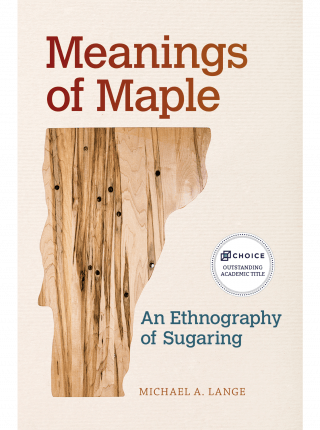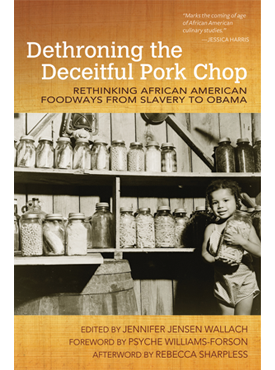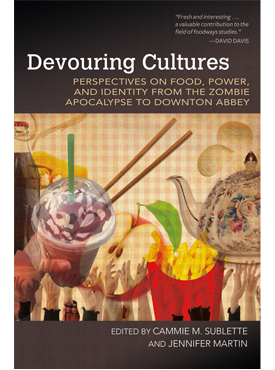Designed to appeal to students of history and foodies alike, American Appetites, the first book in the University of Arkansas Press’s new Food and Foodways series, brings together compelling firsthand testimony describing the nation’s collective eating habits throughout time. Beginning with Native American folktales that document foundational food habits and ending with contemporary discussions about how to obtain adequate, healthful, and ethical food, this volume reveals that the quest for food has always been about more than physical nourishment, demonstrating changing attitudes about issues ranging from patriotism and gender to technology and race.
Readers will experience vicariously hunger and satiation, culinary pleasure and gustatory distress from perspectives as varied as those of enslaved Africans, nineteenth-century socialites, battle-weary soldiers, impoverished immigrants, and prominent politicians. Regardless of their status or the peculiarities of their historical moment, the Americans whose stories are captured here reveal that U.S. history cannot be understood apart from an examination of what drives and what feeds the American appetite.
Jennifer Jensen Wallach is associate professor of history at the University of North Texas and the author or editor of four books, including How America Eats: A Social History of U.S. Food and Culture.
Lindsey R. Swindall is visiting assistant professor of history at Sam Houston State University and the author of three books including The Path to the Greater, Freer, Truer World: Southern Civil Rights and Anticolonialism, 1937–1955.
“A seminal resource on America’s rich and complex food economy.”
—Psyche Williams-Forson
“This invaluable collection of documents shows the crucial place of food in American history. The editors have dug deep into the larder for these readings, which cross lines of race, ethnicity, class, and gender to show how farmers and cooks helped to build the nation.”
—Jeffrey M. Pilcher, author of Planet Taco: A Global History of Mexican Food
“A fine collection of documents spanning the American food experience. From Native American explanations of the ‘three sisters’ crops to Gilded Age menus to the angsts of plenty in the twenty-first century, readers will find a banquet of firsthand accounts detailing the wide-ranging meanings that Americans have given their food over four centuries. Students and food history fans alike will find the essays fascinating and rich.”
—Rebecca Sharpless, author of Cooking in Other Women’s Kitchens: Domestic Workers in the South, 1865–1960
“By giving divergent voices equal weight, Wallach and Swindall invite us to wrestle with the contradictions in food and culture—how we can have so much and yet suffer such hunger; how reconciliation and segregation both find their most powerful metaphors at the table; and how race, ethnicity, gender, religion, and age both obscure and draw forth food choices in our individual and collective lives.”
—Elizabeth Engelhardt, author of A Mess of Greens: Southern Gender and Southern Food
Food and Foodways, a series from the University of Arkansas Press, explores historical and contemporary issues in global food studies. We are committed to telling lesser known food stories and to representing a diverse set of voices. Our strength is works in the humanities and social sciences that use food as a lens to examine broader, social, cultural, environmental, ethical, and economic issues. In addition to scholarly books, we publish creative nonfiction that explores the sensory dimensions of consumption and celebrates food as evidence of human creativity and innovation.
Jennifer Jensen Wallach, Series Editor
Jennifer.Wallach@unt.edu
“This fascinating collection of American food-related documentary sources and images is the first title in the University of Arkansas Press’s new Food and Foodways series, edited by the University of North Texas historian Jennifer Jensen Wallach. American Appetites is a logical first choice for the series as it provides a well-curated, foundational collection of essential sources for students and scholars of American food studies. This is a perfect text to use in American food studies surveys and seminars, as well as American history, American studies, and southern studies courses to introduce the expressive power of food in national and regional life. Much more than an ornamental layer of food stories tacked on to American history, the diverse voices chosen for this collection reveal the historical machinations of colonization, power, conquest, global market forces, and the complex negotiations of race, class, gender, ethnicity, and sexuality. Wallach and Linsey R. Swindall’s insightful introductory essay positions food studies within American historiography and the mid-twentieth-century new social history and cultural turn that prompted scholars to address the meaning of food in our national narrative.”
—Journal of American History, January 2016
Introduction
1. Foundational Food
2. Colonial Culinary Encounters
3. Developing a National Cuisine
4. Nineteenth-Century Expansion
5. Foodways during Enslavement and War
6. Eating in an Age of Decadence and Empire
7. Food and Social Reform in the Progressive Era
8. From Prohibition to the Great Depression
9. Wartime Food and Postwar Consumption
10. Politics, Protest, and Food
11. Contemporary Food Issues
For Further Reading
Index

Adopted at: Colorado Mesa University
Course: HIST 396 History of Food in the US
Course Description: This course interweaves a unique and understudied cultural history of food into the larger context of American history. Examining the purpose of food and its relationship to social, political, and economic trends highlights the ways in which our country has become a global leader in food preparation, production, and consumption. This semester, we will investigate the social and cultural history of America’s relationship with food beginning with the foundational foods of the new world and concluding with contemporary food issues.
Professor: Erika Jackson
Term: Fall 2022
Adopted at: University of North Carolina Chapel Hill
Course: AMST 276 Cooking up a Storm
Course Description: This course will take students on a journey through some of the key moments in “American” food studies and its beginnings across a range of disciplinary homes: the study of nutrition and food security; the study of food systems and the vocabularies that subtend them.
Professor: Elizabeth Engelhardt
Term: Fall 2018
Adopted at: University of Florida
Course: AMH 3931, Special Topics in American History
Course Description: Selected, variable topics in the history and culture of America.
Professor: Nick Foreman
Term: Spring 2015
Adopted at: University of North Carolina, Chapel Hill
Course: AMST 375, Special Topics in American History
Course Description: Examines the history and meaning of food in American culture and explores the ways in which food shapes national, regional, and personal identity.
Professor: Marcie Cohen Ferris
Term: Spring 2016
Adopted at: Washington University, St. Louis
Course: L98-359, American Culture Studies, Eating History: Cultural Creolization and Clash of Tradition in the American East
Course Description: Students will learn to apply methodologies in a multidisciplinary manner across many different types of cultural evidence, and engage with a rigorous reading list drawing upon disparate disciplines in the humanities, social sciences, and hard sciences.
Professor: Sarah Spivey
Term: Spring 2016
Adopted at: San Francisco State University
Course: HIST 642, Historical Perspectives on Culture, Identity and Food History
Course Description: Critically examines the historic role of food and drink –its production, preparation, processing, and politics — in American history and culture from the colonial period to the most recent past.
Professor: Dawn Bohulano Mabalan
Term: Spring 2016





